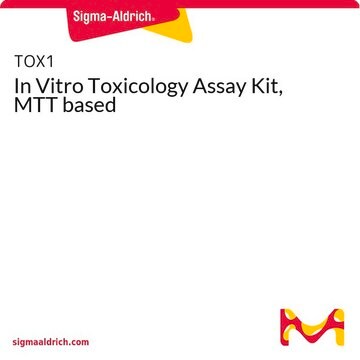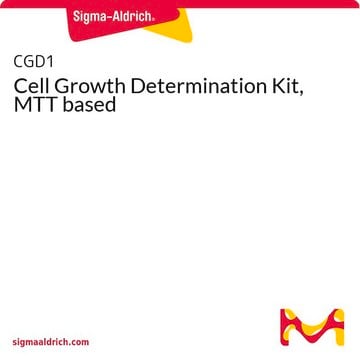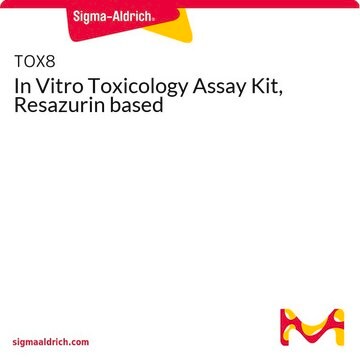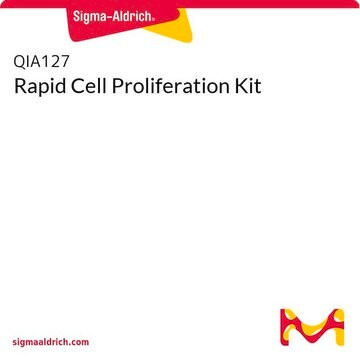추천 제품
일반 설명
MTT is a pale yellow substrate that is cleaved by living cells to yield a dark blue formazan product. This process requires active mitochondria, and even freshly dead cells do not cleave significant amounts of MTT. The colorimetric assay described below can be used for either proliferation or complement-mediated cytotoxicity assays.
애플리케이션
Procedure:
1) Carry out a lymphokine, mitogen, or complement-mediated cytotoxicity assay using standard methods, in 96-well flat-bottomed tissue culture plates of good optical quality (e.g. Falcon). The final volume of tissue culture medium in each well should be 0.1 mL, and the medium (e.g. RPMI or DMEM) may contain up to 10% Fetal Bovine Serum.
2) At the end of the assay add 0.01 mL AB Solution (MTT) to each well. Mix by tapping gently on the side of the tray.
3) Incubate at 37° C for cleavage of MTT to occur. Optimal times may vary according to the assay, but four hours is suitable for most purposes. At the end of this time, the MTT formazan produced in wells containing live cells will appear as black, fuzzy crystals on the bottom of the well.
4) Add 0.1 mL isopropanol with 0.04 N HCl to each well. Mix thoroughly by repeated pipetting with a multichannel pipettor. The HCl converts the phenol red in tissue culture medium to a yellow color that does not interfere with MTT formazan measurement. The isopropanol dissolves the formazan to give a homogeneous blue solution suitable for absorbance measurement.
5) Within an hour, measure the absorbance on an ELISA plate reader with a test wavelength of 570 nm and a reference wavelength of 630 nm. After several hours at room temperature, serum proteins may begin to precipitate due to the acid/alcohol. Chilling the plates will hasten the precipitation. If the plates must be stored before measuring, keep at 4° C before adding the acid/alcohol, then warm to room temperature and add acid/alcohol just before reading.
Results:
The MTT assay will normally detect 200 to 50,000 cells of a typical cell line, although 1,000 to 50,000 is the useful range. This number may vary for other cell types. Cytotoxic assays should be set up so that the control, unlysed cells give a signal of 0.2 to 0.4, and proliferation assays should yield a similar value at plateau concentrations. This corresponds to about 20-50,000 cells per well with a typical cell line.
Absorbance is directly proportional to the number of cells; actual cells do not absorb significantly, even up to concentrations of 1 x 106 cells/mL.
1) Carry out a lymphokine, mitogen, or complement-mediated cytotoxicity assay using standard methods, in 96-well flat-bottomed tissue culture plates of good optical quality (e.g. Falcon). The final volume of tissue culture medium in each well should be 0.1 mL, and the medium (e.g. RPMI or DMEM) may contain up to 10% Fetal Bovine Serum.
2) At the end of the assay add 0.01 mL AB Solution (MTT) to each well. Mix by tapping gently on the side of the tray.
3) Incubate at 37° C for cleavage of MTT to occur. Optimal times may vary according to the assay, but four hours is suitable for most purposes. At the end of this time, the MTT formazan produced in wells containing live cells will appear as black, fuzzy crystals on the bottom of the well.
4) Add 0.1 mL isopropanol with 0.04 N HCl to each well. Mix thoroughly by repeated pipetting with a multichannel pipettor. The HCl converts the phenol red in tissue culture medium to a yellow color that does not interfere with MTT formazan measurement. The isopropanol dissolves the formazan to give a homogeneous blue solution suitable for absorbance measurement.
5) Within an hour, measure the absorbance on an ELISA plate reader with a test wavelength of 570 nm and a reference wavelength of 630 nm. After several hours at room temperature, serum proteins may begin to precipitate due to the acid/alcohol. Chilling the plates will hasten the precipitation. If the plates must be stored before measuring, keep at 4° C before adding the acid/alcohol, then warm to room temperature and add acid/alcohol just before reading.
Results:
The MTT assay will normally detect 200 to 50,000 cells of a typical cell line, although 1,000 to 50,000 is the useful range. This number may vary for other cell types. Cytotoxic assays should be set up so that the control, unlysed cells give a signal of 0.2 to 0.4, and proliferation assays should yield a similar value at plateau concentrations. This corresponds to about 20-50,000 cells per well with a typical cell line.
Absorbance is directly proportional to the number of cells; actual cells do not absorb significantly, even up to concentrations of 1 x 106 cells/mL.
성분
Reagent A: MTT, (3-(4,5-dimethylthiazol-2-yl)-2,5-diphenyl tetrazolium bromide), 50 mg/vial.
Solution B: PBS pH 7.4, 15 mL
Solution B: PBS pH 7.4, 15 mL
저장 및 안정성
Maintain at 2-8°C for up to six months. The Reagent A / Solution B mixture is stable at 2-8°C for up to two weeks.
Reagent Preparation:
Add 10 mL Solution B to one vial of Reagent A. Mix well, sterile filter and keep in the dark at 4° C until used. Note: It may take overnight to dissolve. Do not heat solution. When absolutely required to dissolve crystals, adjust pH with 1-2 drops of HCl. The AB mixture is stable for several weeks under these conditions.
Reagent Preparation:
Add 10 mL Solution B to one vial of Reagent A. Mix well, sterile filter and keep in the dark at 4° C until used. Note: It may take overnight to dissolve. Do not heat solution. When absolutely required to dissolve crystals, adjust pH with 1-2 drops of HCl. The AB mixture is stable for several weeks under these conditions.
법적 정보
CHEMICON is a registered trademark of Merck KGaA, Darmstadt, Germany
면책조항
Unless otherwise stated in our catalog or other company documentation accompanying the product(s), our products are intended for research use only and are not to be used for any other purpose, which includes but is not limited to, unauthorized commercial uses, in vitro diagnostic uses, ex vivo or in vivo therapeutic uses or any type of consumption or application to humans or animals.
신호어
Warning
유해 및 위험 성명서
Hazard Classifications
Eye Irrit. 2 - Muta. 2 - Skin Irrit. 2 - STOT SE 3
표적 기관
Respiratory system
Storage Class Code
10 - Combustible liquids
시험 성적서(COA)
제품의 로트/배치 번호를 입력하여 시험 성적서(COA)을 검색하십시오. 로트 및 배치 번호는 제품 라벨에 있는 ‘로트’ 또는 ‘배치’라는 용어 뒤에서 찾을 수 있습니다.
이미 열람한 고객
The effect of nicotine on the production of soluble fms-like tyrosine kinase-1 and soluble endoglin in human umbilical vein endothelial cells and trophoblasts.
Ja-Young Kwon,Sang-Wook Bai,Young-Guen Kwon,Se-Hoon Kim,Chul Hoon Kim,Moung Hwa Kang et al.
Acta Obstetricia et Gynecologica Scandinavica null
The mammalian molecular clockwork controls rhythmic expression of its own input pathway components.
Martina Pfeffer,Christian M Muller,Jerome Mordel,Hilmar Meissl,Nariman Ansari et al.
The Journal of Neuroscience null
Praveen Bhoopathi et al.
Cancer research, 76(12), 3572-3582 (2016-05-20)
Advanced stages of neuroblastoma, the most common extracranial malignant solid tumor of the central nervous system in infants and children, are refractive to therapy. Ectopic expression of melanoma differentiation-associated gene-7/interleukin-24 (mda-7/IL-24) promotes broad-spectrum antitumor activity in vitro, in vivo in
Genotypic variability and persistence of Legionella pneumophila PFGE patterns in 34 cooling towers from two different areas.
Inma Sanchez,Marian Garcia-Nu?ez,Sonia Ragull,Nieves Sopena,Maria Luisa Pedro-Botet et al.
Environmental Microbiology null
Jean-Pierre Etchegaray et al.
Molecular and cellular biology, 29(14), 3853-3866 (2009-05-06)
Both casein kinase 1 delta (CK1delta) and epsilon (CK1epsilon) phosphorylate core clock proteins of the mammalian circadian oscillator. To assess the roles of CK1delta and CK1epsilon in the circadian clock mechanism, we generated mice in which the genes encoding these
문서
Quality control guidelines to maintain high quality authenticated and contamination-free cell cultures. Free ECACC handbook download.
암, 신경과학, 줄기 세포 연구 응용분야를 위한 세포 증식(BrdU, MTT, WST1), 세포 생존성, 세포 독성 실험용 세포 기반 분석법.
Cell based assays for cell proliferation (BrdU, MTT, WST1), cell viability and cytotoxicity experiments for applications in cancer, neuroscience and stem cell research.
자사의 과학자팀은 생명 과학, 재료 과학, 화학 합성, 크로마토그래피, 분석 및 기타 많은 영역을 포함한 모든 과학 분야에 경험이 있습니다..
고객지원팀으로 연락바랍니다.














